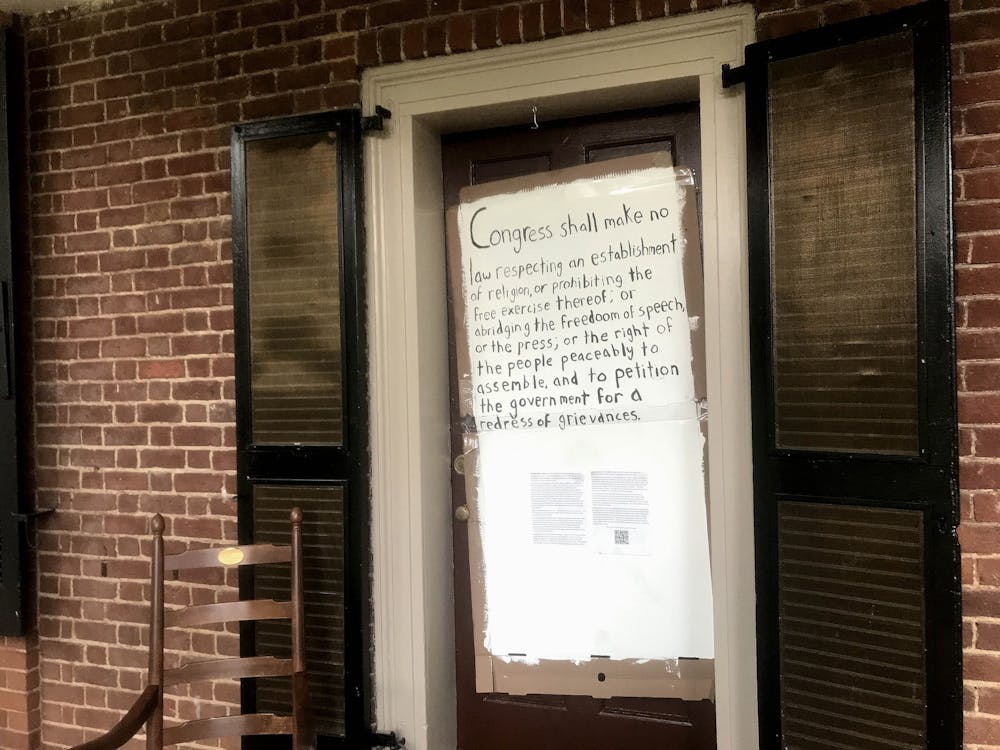Lea en español
Fourth-year College student Emma Camp posted a sign on her Lawn room door Friday — Constitution Day — in protest of the University’s newly implemented policy which restricts the size of signs allowed on Lawn room doors. The sign contained the full text of the First Amendment and takes up almost the entirety of the door — far larger than the size of the two message boards the current policy restricts signage to.
In an interview with The Cavalier Daily, Camp said her main goal in posting the sign is to have the policy changed. The restrictions to Lawn room door signage were implemented this academic year following controversy over Lawn room signs displayed last fall and spring that critiqued the University's history of enslavement and accessibility.
“[The University said] ‘Okay, we don’t like what Lawnies are putting on their doors, so we're going to essentially keep them from putting large signs on their doors,’”Camp said. “And I realized that that is something I couldn’t abide.”
Camp put the sign up early Friday morning, 234 years after the signing of the Constitution. Camp said that before posting the sign, she sent an email to the Office of the Dean of Students letting them know that she would be adding the display to her door and acknowledging that this would break the Lawn resident policy.
Camp said Interim Dean of Students Julie Caruccio responded and thanked Camp for her “reasoned heads up” and that Housing and Residence Life would be following up.
HRL sent an email to Lawn residents Tuesday saying that many rooms were not “in compliance” with the policy and that facilities management staff would be removing any non-compliant items at noon Wednesday if residents did not take them down.
As Camp did not take down her sign, staff members arrived to remove the sign from her door Wednesday afternoon as Camp filmed them.
“That’s bulls—t,” one passerby says in the video as a staff member folds the sign in half.
HRL also removed other residents’ items, including 8.5 by 11 inch fliers that did not fit within the constraints of the message boards. One such flier was removed from the Lawn room door of Abel Liu, fourth-year College student and president of Student Council.
“The bottom line is that, in my experience, we are not seeing content-neutral guidelines or enforcement,” Liu said. “These guidelines are a reaction to Black and Brown students utilizing free speech in a unique space to highlight the institution’s violent past. The University has not been consistent in requiring compliance with its own Lawn room policies.”
Another Lawn resident was forced to trim his poster — which advocated for reproductive rights — down by one inch so that it would fit on the board.
“Pretty much every single one of the pin boards [HRL] gave us is smaller than an 8.5 by 11 sheet of paper, so it's nearly impossible to post anything without it going over the edge of the board,” Camp said.
While Camp is the first Lawn resident to protest with a larger sign, she is not the first to critique the new policy. Current and former Lawn residents previously called the restrictions “very hypocritical” and said they served “no good purpose.”
“I love U.Va., I’m extremely grateful for the opportunities I’ve had in my time here, but I think a bad call was made in regards to restrictions on Lawn signage,” Camp said.
Camp said she finds it “cowardly” that the University — whose Board of Visitors endorsed an “unequivocal” commitment to free speech last June — has “failed to uphold those precedents” by removing and restricting signs.
“[My hope is that] we can get back to having this beautiful tradition that we used to have of Lawn rooms just covered in posters and pride flags and fliers and messages,” Camp said. “It was this really wonderful beautiful thing that has died out because of this new policy.”
The University currently has a green-light rating from the Foundation for Individual Rights in Education, a nonpartisan foundation which works to “defend and sustain the rights of students and faculty at America’s colleges.” Green-light institutions are those whose “policies nominally protect free speech,” according to the FIRE.
The University is currently rated 22 on FIRE’s College Free Speech Rankings list. This is a drop from 2020, when it placed sixth.
“There’s very much this idea that if speech upsets you, that means the speech shouldn’t be allowed to exist,” Camp said. “If we have these rights but not a culture of free speech, that’s not great because people have rights they don’t use.”
Camp hopes her actions will inspire other Lawn residents to fight back against the policies.
“I hope I inspire other people to put up signs,” Camp said. “Freedom of speech is the hill I’ve decided to fight and die on.”







